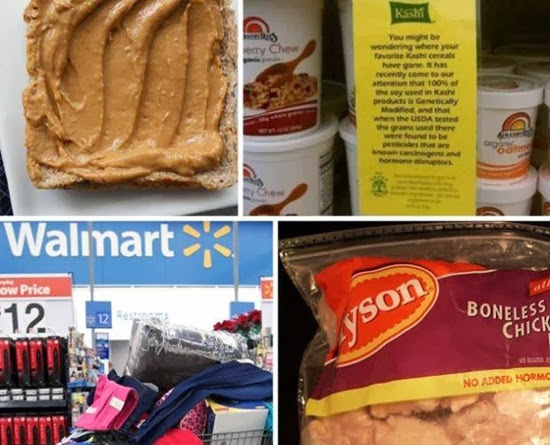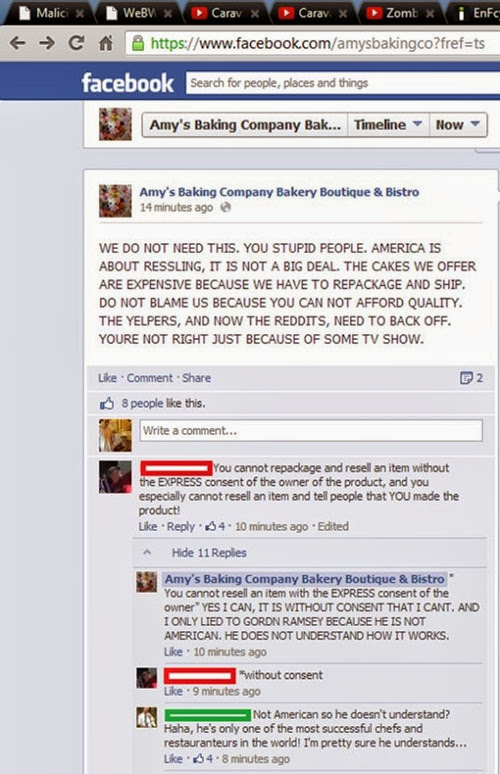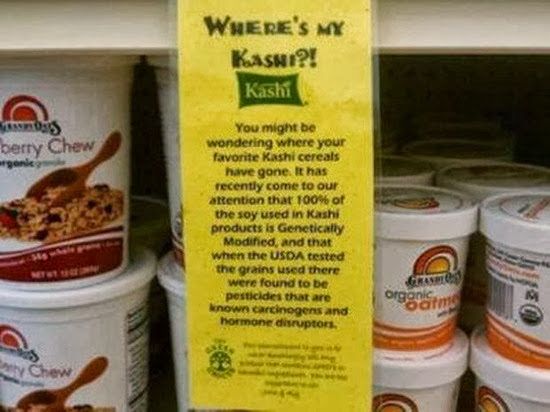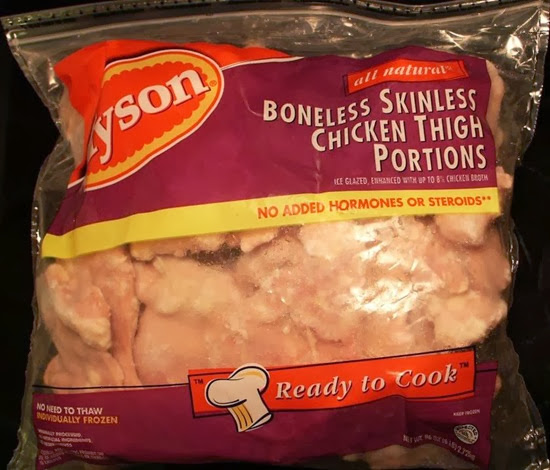
Everyone knows that marketing is a deceitful business, but most would be surprised to find out just how manipulative companies can be about their products. Whether it’s cigarettes, food, or even government employed background checks, no one can be trusted entirely; regulations and industry standards are in place for a reason, and a company’s ethics and dependability must be seriously questioned when those rules - and that trust - is breached. Here are ten daunting (but not always surprising) lies told by companies that will make you rethink the amount of research you do before your next purchase.
1. Amy’s Baking Company
Who can forget the total train wreck of a company that is Amy’s Baking Co? In early 2013, Amy’s Baking Company was featured on an episode of Chef Ramsay’s Kitchen Nightmares, in which he tried to help them clean up their act by changing up their menus - and their attitudes.
The episode can be summed up by noting that this was the only restaurant which Ramsay had ever abandoned due to their terrible work ethics and refusal to change. Amy and her husband are seen yelling at customers on camera, berating their own staff, and having public meltdowns inside their store.
And then come the lies. Not only was Amy’s Baking Company doing a terrible job of keeping customers happy or returning, but they were discovered to be selling cakes and pastries that had been bought by third party wholesalers - and passing them off as their own.
As if it weren’t bad enough that Amy’s Baking Company was selling stale old cake that they claimed was their own, owner Amy had a dramatic meltdown on Facebook and Reddit after she was ousted. No apology, no plans to change up the way the company works, just straight up lunacy. Amy cursed at her (presumably former) customers, accused “haters” of trying to “bring them down out of jealousy,” and stated that there was nothing wrong or illegal about repackaging third party goods. As if that makes their deceitfulness any better.
2. BP
It is highly doubtful that anyone will soon forget the enormous and horribly detrimental oil spill that occurred in the Gulf of Mexico in 2010 due to company incompetency and failure to follow safety regulations. Besides having to pay millions of dollars in reparations, BP is still fighting a lawsuit that claims that the oil company lied to the government about the severity of the oil spill in order to save face.
The difference between truth and a lie is 70 million gallons of oil deep in this case, and the lawsuit could result in multi-billion dollar penalties being brought against BP.
After three years, BP continues to maintain the claim that all spill preparations, which were pretty much limited to a single page of “source control” in their 600-page oil spill response plan, were in total compliance with every government rule and regulation and met industry standards.
BP’s internal documents and emails regarding how much oil was spilled following the days of the explosion drastically contradict what was released to the government and the public - coming in at 20 times the amount they settled on when formulating their lie.
The bottom line is that it was not profitable to stop drilling for oil even when safety concerns arose, it was not profitable for BP to initially spend any money on preventative measures or safety preparations, and it was not profitable for BP to admit the size of their oil spill.
Under the Clean Water Act, the maximum fine for spilling oil is US$1,100 per barrel, but can be raised to US$4,300 per barrel under circumstances of “gross negligence.”
3. McAfee
What’s the best way to get people to buy your antivirus software? Convince them that cyber crime is an imminent threat, only going to get worse, and that you know this because your company is big and smart enough to have done enough research to come up with specific statistics and dollar signs regarding the existence and fixability of said problem.
That’s exactly what McAfee did in 2009 when they ‘estimated’ (but more like ‘guesstimated’) that global losses from cyber crime cost approximately US$1 trillion. President Obama, National Security Agency director Keith Alexander, and other politicians repeatedly used this figure in speeches lobbying for stronger anti-cyber crime laws and calling for stronger cyber-security.
Unfortunately, that number changed drastically when a more recent report by the same company estimated losses to be around US$300 billion. McAfee’s global chief technology officer, Mike Fey, admitted that he “regretted his own company’s estimates” and stated that this type of crime was “hard to put a dollar sign on.” While that may be true, the difference between US$1 trillion and US$300 billion is large enough to raise some eyebrows at.
4. Kashi
Ah, Kashi, everyone’s first choice for super-healthy, tastes-just-like-my-favourite-cardboard-box breakfast cereal. Kashi made a lot of promises about using strictly organic grains, seeds, and soy in their products. And Kashi lied.
In 2012, Kashi was outed for using GMO soy in its cereal when it underwent testing and came up positive for being both Genetically Modified and containing pesticides that are known carcinogens and hormone disruptors.
When a picture of a sign denouncing Kashi for their deceptiveness hanging on a grocery store shelf went viral, Kashi’s Facebook page blew up with criticisms from (former) customers who were outraged at the lie they had been literally fed.
In response to the picture (and catalytic study by the Cornucopia Institute), Kashi tried to sort of “play dumb” by noting that pollen drift, handling, shipping, or any number of things could have contaminated their products with GMOs and that this is somewhat of an incorrigible problem. They undoubtedly lost a bunch of customers over the fiasco, whether they knew what was going on in their products or genuinely did not - the latter of which being extremely hard to believe.
5. NSA Background Checks
Edward Snowden is an internationally famous whistle-blower who, after working at both the CIA and NSA, gave up details about several top-secret US and British surveillance programs to the public. Although it is completely feasible that any CIA or NSA employee might some day retreat upon his or her own former beliefs and decide to expose vulnerable government information to the public, Snowden’s case is particularly interesting because he was initially screened by a company called USIS - now under fire for repeatedly “misleading the government about the thoroughness of its background checks,” and even outsourcing some of them entirely.
The web becomes even more tangled: The security process for government hiring is convoluted, backlogged and jammed up to begin with. So the fate of USIS becomes more complicated; instead of being fired immediately, the company was instructed to “perform responsibly or else.”
USIS is accused of skipping the “second review,” or a follow-up review during which the company is supposed to make sure that no detail of a candidate’s background was overlooked during the first screening process.
6. Peanut Corp.
Peanut Corp, a company whose revenue was a mind blowing US$25 million in 2008, has been caught shipping out salmonella-contaminated peanuts on two separate occasions, trying to sell 8,000 cases of mould-infested Walmart “kisses,” and shipping over 40,000 tons of mouldy nuts to a confection company in Indiana. Their offenses began in 1990, the latest one occurring as recently as 2009.
A federal grand jury indicted former executives of Peanut Corp in February of 2013 for allegedly knowing that their peanuts were infected with salmonella bacteria before shipping out products that would eventually sicken customers (even contributing to one death) and cause a massive peanut butter product recall across the United States.
Over 700 people in 46 states fell ill after eating peanut products from Peanut Corp, whose executives are accused of failing to keep rats and insects out of their plants, of shipping contaminated products and of blatantly lying on quality-assurance labels and to investigators.
Cookies, cereal and pet treats were pulled from shelves as a result of the recall, caused by the negligence and lies put forth by the accused executives.
7. Big Tobacco
All cigarettes cause cancer. All cigarettes cause heart disease, lung disease, and premature death.
Those might seem like obvious statements, but companies - big tobacco, in this case - are adept at using subtle marketing tactics to obscure the truth and sway those on the fence in their favour. And so were born lawsuits brought against Altria Group Inc, Phillip Morris USA, Lorillard Inc and Reynolds American Inc in a case that raged from 1999 to 2006; US District Judge Gladys Kessler eventually ordered the four tobacco companies to immediately cease advertising their products as “light” and “low-tar,” since they were considered deceptive.
The 55-page ruling stated that “a federal court has ruled that the defendant tobacco companies deliberately deceived the American public” before delving into pages of information about the specific dangers of smoking and exposure to second-hand smoke.
Tobacco companies were ordered to public warnings with their products, on their advertisements and on their websites alongside confessions that they lied to the public about the dangers and health effects of smoking. However, we don’t think the lying - or the newfound honesty - is deterring anyone.
8. Tyson Chicken
Tyson, infamous poultry producer which has been the subject of much controversy regarding their unethical treatment of both their animals and employees, was slammed in 2008 when the USDA accused the company of using antibiotics on their chicken and claiming that they had not.
Although the labels on their bags of frozen and fresh chicken boasts the claim that no hormones or antibiotics are ever given to any of their animals, Tyson was ousted as a liar after the USDA discovered, through testing, that Tyson regularly gave antibiotics to their chickens.
Tyson had previously faced a federal lawsuit for claiming that their meat was antibiotic-free after admitting that they did actually feed their chickens ionophores, which are considered an antibiotic but ultimately controversial for two reasons:
- Ionophores are not used to treat humans.
- Tyson has enough money to have just about any case against them manipulated in their favour and later dismissed.
Tyson not only used the antibiotic gentamicin to beef up the health of their chicks, but utilized what can only be seen as a dangerous loophole by injecting the eggs themselves with this chemical.
In response, Tyson announced that they would “voluntarily withdraw” their misleading labels and request that the USDA start a “public process to bring more clarity and consistency to labelling and advertising rules,” as if they didn’t know exactly what they were doing as they were doing it.
9. Walmart
Does anyone care when Walmart is caught in the middle of a big, fat lie? It’s happened multiple times, but their customers don’t seem to be turning anywhere else for deals so good that they are literally evil. People have come to expect nothing less than deceptive claims and cheap, slave-made products from this behemoth chain store.
In 2011, a number of Walmart stores in China were forced to close after it was discovered that regular pork was routinely being labelled as more expensive, organic pork. And this was after Chinese Walmarts were penalized a whopping 21 times for false advertising, incorrect labelling, food safety concerns, and a number of other violations.
10. Whole Foods
While Whole Foods did not blatantly lie to their consumers, they did pull a sneaky move that was undoubtedly deceptive and misleading at the very least.
“Nothing Artificial, EVER!” Yells out a slogan painted on the side of almost every Whole Foods building in all capital letters. Although it’s always wise to make sure you check each and every one of your so-called “organic” products for verification before you purchase them, many people took Whole Foods’ statement at face value and simply assumed that all products carried therein were, as stated, non-artificial. Which would exclude GMO produce from their stock - or so you would think.
When a video was made asking customers outside of Whole Foods whether or not they were aware that the grocery chain did in fact sell GMO products, most people were shocked. Whole Foods executive Libba Letton approached the filmmakers to try and diffuse the situation, but only wound up making things worse when she tried to cover up the blunder by stating “I don’t think that Whole Foods does anything to try and make people think that we don’t have food with GMOs in them."
It’s no coincidence that Whole Foods is now overzealously advertising a newly adopted motto of “We promise total and complete transparency by 2018!”










No comments:
Post a Comment
Please adhere to proper blog etiquette when posting your comments. This blog owner will exercise his absolution discretion in allowing or rejecting any comments that are deemed seditious, defamatory, libelous, racist, vulgar, insulting, and other remarks that exhibit similar characteristics. If you insist on using anonymous comments, please write your name or other IDs at the end of your message.